
July 25
1848 Birth: Arthur James Balfour:
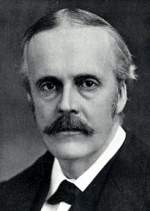
His interest in Zionism started in 1917 when he made a much-discussed speech which came to be known as the Balfour declaration, advocating a national home for Jews in Palestine. His political enemies said he made the declaration for its effect on America and her participation in the war. Whether that was true or not, his interest developed and his sincerity after the war was never questioned.
The Balfour declaration soon became the recognized standard of Zionist ideals for Palestine, and it likewise was the basis of the organization of the Jewish Agency, composed of Zionists and non-Zionists, who met at Zurich, Switzerland, in the Summer of 1929 to form a cooperative body to advance the Jewish homeland ideal. The twelfth anniversary of his speech was celebrated nationally by Zionists on Nov. 4, 1929.
In 1925 Lord Balfour visited Jerusalem to open the Hebrew University there. His attitude had aroused the ire of nationalist Arabs, and his trip to Palestine ended by his being spirited out of Damascus after a furious outburst on the part of an Arabian mob. [For further information, click here.]
1894 First Sino-Japanese War:
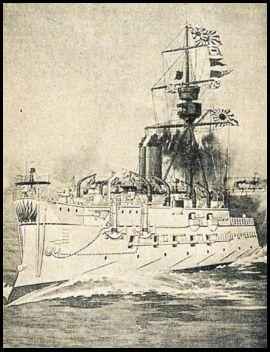
At the Battle of Pungdo the Japanese cruisers Yoshino, Naniwa and Akitsushima sink the British steamer Kowshing, knowing full well its charter status as a British transport (See: July 14, 1894). About half the Chinese are picked up by a French gunboat or escape to the islands. No attempt to save any lives is made by the Japanese. (Jane, Sondhaus, Connaughton, Sedwick) [For further details, Click here.]
1894 Birth: Gavrilo Princip: Serbian nationalist, who will assassinate Archduke Franz Ferdinand, a crime that will spark World War I:

Gavrilo was one of nine children, six of whom died in infancy. His health was poor and from an early age suffered from tuberculosis . . . . Under Austro-Hungarian law, capital punishment could not be imposed on someone who was under the age of twenty when they had committed the crime. Princip therefore received the maximum penalty of twenty years.

1898 Spanish-American War: The Puerto Rican Campaign begins as US General Nelson A. Miles, with 3,300 soldiers, lands at Gu�nica. (Trask)
1914 Countdown to World War: Russia declares that it will act to protect Serbian sovereignty: Excerpt from a letter despatched from Berlin during the period 24-26 July 1914 by the Belgian ambassador to Germany, Baron Beyens:
[The] German press, with the exception of course of the socialist papers, appears to have recovered from the first astonishment caused by the Austro-Hungarian note. It plays the part of chorus to the press of Vienna and Budapest, and contemplates coolly the contingency of war while expressing the hope that it will remain localized. Finally, the view gains ground more and more among my colleagues - and I believe it to be well founded - that it is not so much a desire to avenge the death of the Hereditary Archduke and to put an end to the pan-Serbian propaganda, as an anxiety for a personal rehabilitation as a statesman which has induced Count Berchtold to send to Belgrade this incredible and unprecedented note. From the moment when his personal feelings and reputation are at stake it will be very difficult for him to draw back, to temporize and not to put his threats into execution.
1915 World War I: Various:
War at Sea: A German U-boat sinks an American cargo ship, the Leelanaw bound from Archangel to Belfast; the first destruction of an American ship by submarine.

List Regiment: Gefreiter Adolf Hitler's 16 Reserve Infantry Regiment continues to occupy a position at Fromelles—pictured above in a drawing by Hitler—on a level field with water channels, willow trees and willow stalks; in the distance towards the enemy lines lies an insignificant wood with barbed wire entanglements. Under the direction of their defense-minded commander, Lieutenant General Gustav Scanzoni von Lichtenfels, the regiment works ceaselessly day and night to further fortify their position at Fromelles while fighting off repeated assaults by the enemy. [For further details, Click here.]
1916 World War I: Various:
Turkish front: General Yudenich routs the Turkish Third Army, and then turns on the Turkish Second Army.
The Bitlis was the last defense point for the Ottoman Army to prevent the Russians from moving into central Anatolia and Mesopotamia. After the capture, the Ottoman Army asked Mustafa Kemal to organize the defense in the region. When Mustafa Kemal was assigned to his post, the enemy forces were in constant advance.
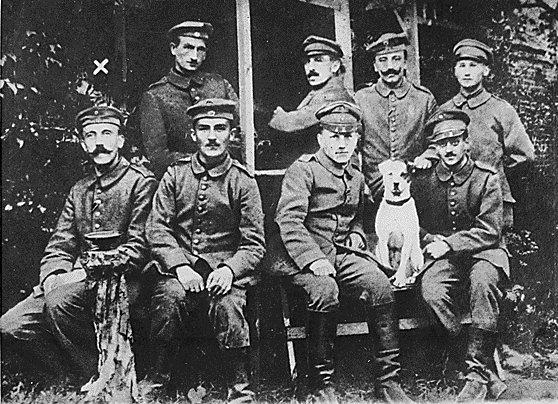
List Regiment: Gefreiter Adolf Hitler endures trench warfare in Flanders (Artois) with 3 Company, 16 Reserve Infantry Regiment. [For further details, Click here.]
1917 World War I: Various:

Mata Hari sentenced to die: In Paris, France, the exotic dancer Mata Hari is sentenced to death by a French court for spying on Germany's behalf during World War I
Since 1903, Margueretha Gertruida Zelle, born in a small town in northern Holland and formerly married to a captain in the Dutch army, had performed in Paris as a dancer. She adopted the stage persona of Mata Hari, claiming she was born in a sacred Indian temple and taught ancient Indian dances by a priestess who gave her the name, which meant "eye of the dawn." Her exotic dances soon earned her fans all over Europe, where she packed dance halls from Moscow to Berlin to Madrid, largely because of her willingness to dance almost entirely naked in public.
Mata Hari also became a celebrated courtesan, and by the outbreak of World War I, her catalog of lovers included high-ranking military officers and political figures from both France and Germany. The circumstances of her alleged spying activities during the war were and remain unclear: it was said that, while in the Netherlands in 1916, she was offered cash by a German consul to report back information obtained on her next visit to France. It appears that British intelligence discovered details of this arrangement and passed them on to their counterparts in France. In any case, Mata Hari was arrested in Paris in February 1917.
Under interrogation by French military intelligence, Mata Hari herself admitted that she had passed outdated information to a German intelligence officer, yet she claimed that she had also been paid to act as a French spy in Belgium (then occupied by the Germans), though she had not informed the French of her prior dealings with the German consul. She was apparently acting as a double agent, though the Germans had apparently written her off as an ineffective agent whose activities had produced little intelligence of value.
List Regiment (July 22-August 3): Dispatch Runner Gefreiter Adolf Hitler serves at the front with 3 Company, 16 Bavarian Reserve Infantry Regiment during Phase 2 operations in Flanders. Most of their time in the trenches gas masks are worn, while English bombers and tanks—a new terror witnessed for the very first time by most—attempt to advance over a long front through seas of mud. [For further details, Click here.]
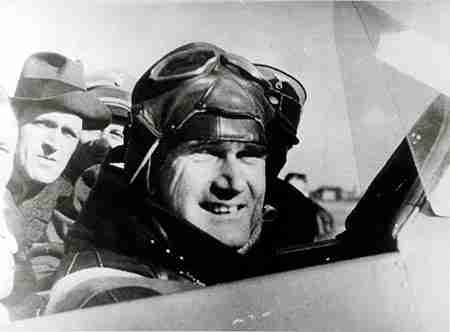
Rudolf Hess is injured in his left arm at Oituz Pass in Romania, but stays with his unit. (THP)
1918 World War I: Various:
List Regiment (July 20-August 4): Gefreiter Adolf Hitler's 16th RIR continues building a new line of defenses on the site of the failed Second Battle of the Marne. [For further details, Click here.]
FDR: President Wilson's Assistant Secretary of the Navy, Franklin D. Roosevelt, is introduced to Winston S. Churchill (then Minister of Air and War) in London. Neither is initially impressed by the other.
The political history of the 20th century can be written as the biographies of six men: Lenin, Stalin, Hitler, Mao Zedong, Franklin Roosevelt and Winston Leonard Spencer Churchill. The first four were totalitarians who made or used revolutions to create monstrous dictatorships. Roosevelt and Churchill differed from them.
Some 313,000 US troops arrive in France during July:
Throughout 1917 and into 1918, American divisions were usually employed to augment French and British units in defending their lines and in staging attacks on German positions. Beginning in May 1918, with the first United States victory at Cantigny, AEF commanders increasingly assumed sole control of American forces in combat. By July 1918, French forces often were assigned to support AEF operations.
Russian Revolution: The Fifth All-Russian Congress of Soviets mobilizes the Red Army.(THP):
Food clothing and propaganda have made the army loyal. Trotsky's personality and his knowledge of military strategy were an important factor for years. Although he has spent most of his life as a red agitator and writer, he has always been a student of military strategy, has written a book on Napoleon's manoeuvres and has been given credit for building the keenest morale and using the keenest military strategy in the numerous campaigns in which Russia defeated her enemies . . . .
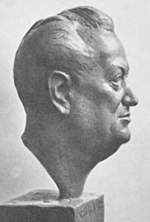
Volkishness: Sebottendorff buys the Beobachter, a minor weekly newspaper in the Munich suburbs, for 5,000 marks from the estate of Franz Eher who had died in June. He soon renames it the Muenchener Beobachter and publishes it, until May 1919, at the Germanenorden (Thule) offices in the Four Seasons Hotel. Baron Sebottendorff leases five large club rooms, accommodating 300 guests, at Munich's fashionable Four Seasons Hotel (Hotel Vierjahreszeiten). Meetings until this time had been held at his apartment on Zweigstrasse. (THP)
1927 An early essay by Goebbels, published in the fourth issue of his paper, Der Angriff:
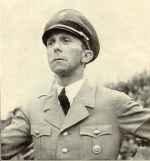
The German people is an enslaved people. Under international law, it is lower than the worst Negro colony in the Congo. One has taken all sovereign rights from us. We are just good enough that international capital allows us to fill its money sacks with interest payments. That and only that is the result of a centuries-long history of heroism. Have we deserved it? No, and no again! Therefore we demand that a struggle against this condition of shame and misery begin, and that the men in whose hands we put our fate must use every means to break the chains of slavery.
1933 Eugenics: Passage of the "Law for the Prevention of Genetically Diseased Offspring" (Gesetz zur Verhutung erbkranken Nachwuchses) is publicly announced. Allowing forced sterilization, it will officially go into effect on January 1, 1934.
There is nothing wrong with family planning . . . . But there is something very wrong in societies making value judgments about individual worth and removing choices from others. Those societies start off by devaluing some of their own citizens and end by destroying themselves.
1934 Austria: July Putsch: About noon, 150 men dressed in the uniform of the Austrian Army seize the Federal Chancellery. Chancellor Dollfuss is wounded trying to escape, being shot twice at close quarters. The radio building in the center of the town is overwhelmed, and the announcer is compelled to broadcast the news that Dollfuss had resigned and that Dr. Rintelen had taken his place as Chancellor. Although the Putsch fails, the insurgents keep control of the Chancellery building, and agree to give it up only after they have a safe conduct to the German border. The insurgents contact the German Minister Dr. Rieth by telephone and subsequently have private negotiations with him in the building. At about 7 PM they yield the building, but Chancellor Dollfuss breaths his last about 6 PM, not having had the services of a doctor. The German Government denies all complicity in this Putsch and in this assassination. Hitler removes Dr. Rieth as Minister on the ground that he had offered a safe conduct to the rebels without making inquiry of the German Government, and had thus without reason dragged the German Reich into an internal Austrian affair in public sight.
From the IMT testimony of Michael Skubl, former Chief of Police in Vienna, and State Secretary for Matters of Public Security:Dr. Dollfuss had appointed me Inspector General of the Police the day before he was murdered on 24 July. I had enjoyed his full confidence. When Seyss-Inquart was appointed Minister of the Interior and of Security, I was attached to him as State Secretary. Consequently, I was directly subordinate to him, whereas until that time I had been subordinated directly to the Federal Chancellor as Chief of Security. As Chief of Police and State Secretary for Matters of Public one of my leading tasks was, of course, to combat illegal movements, and particularly National Socialist aggression.
Dr. Seyss-Inquart admitted being a National Socialist. However, as far as I know, the so-called 120 or 150 percent National Socialists—that is to say, the leaders of the illegal movement—did not consider him a 100 percent National Socialist. He was, however, considered a very suitable person to be used as a piece on the chessboard of the National Socialist movement. It was my impression that he was more led than leading. There were no rifts in our understanding. It was a completely harmonious understanding. Federal Chancellor Schuschnigg was the chief of the Government, and in that capacity he was naturally my highest superior. It was natural that I should make reports to the Federal Chancellor regularly and upon special summons, and that I should also have received instructions from him in return.
Mussolini masses Italian troops at the Brenner Pass to prevent a takeover of Austria.
From Adolf Hitler and the German Trauma by Robert Edwin Herzstein:Everyone assumed, probably correctly, that the Germans had instigated the coup. Mussolini, still nominally friendly to Italy's former allies of the World War, rushed troops to the Brenner Pass. Hitler, fearing a confrontation with Mussolini, denied any responsibility for the assassination of Dollfuss. Relations between Germany and Austria continued to be disastrous, however, for Hitler�s hatred of Austrian provincialism and Catholicism was boundless, and he felt with a special passion the desire to bring German-Austria back into the Reich as the Ostmark or the East March. As long as Mussolini opposed this plan, however, Hitler would have some difficulty in achieving his aim. Germany was not rearmed by 1934, and Hitler had no desire to jeopardize a future alliance with Mussolini . . . . .
The assassination of Dollfuss shocked opinion in Austria and the world. Kurt von Schuschnigg, Dollfuss' successor, pledged to continue the policies of the martyred leader. When Dollfuss lay in state, thousands of people came to Vienna to pay their last respects to him. Schuschnigg was a schoolmasterly, authoritarian type who had little of Dollfuss' earnest, yokel-like charisma. He did reach a tentative modus vivendi with the Germans in 1936, but Schuschnigg knew that Austrian independence ultimately depended upon the goodwill of Mussolini and Allied determination. Mussolini had been particularly furious because of the presence of Dollfuss' family in Italy at the time of his assassination. Schuschnigg tried to put together an Austrian coalition which would defend Austrian independence against the Nazis. Austria's economic plight remained disastrous, however, and the Nazis made many recruits in the provinces.
Death: Engelbert Dollfuss: After being denied the benefits of medical care for the past six hours, Chancellor Engelbert Dollfuss dies from his injuries.
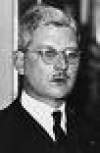
Kurt Alois Josef Johann Schuschnigg becomes Austria's new Federal Chancellor. At the age of 36, he is the youngest person to have ever held the position.
From Franz von Papen's testimony before the IMT:
On 25 July, the day of the murder of Dollfuss, Hitler rang me up in the middle of the night, and asked me to go to Vienna at once as his Ambassador. I asked: 'What gave you this odd idea?' He informed me of Dollfuss' murder, of which I had not yet heard, and said: 'It is absolutely essential that someone who knows the conditions there should take over affairs at once.' I replied that I could not possibly give my decision on such a step over the telephone, whereupon he asked me to come to Bayreuth at once to discuss it . . . .
In the discussion in Bayreuth, Hitler put it to me that I was the only available person who could re-establish a favorable situation in Austria, because, of course, Hitler knew my attitude toward that problem from the numerous protests I had raised in the Cabinet against Austria's treatment. He also knew that I had been a friend of the murdered Dr. Dollfuss and that I knew Herr von Schuschnigg. I stated my conditions and these conditions were: The immediate recall of the Party Gauleiter, Herr Habicht, who was in Austria by Hitler's order. Hitler was of the opinion that if he did this it would amount to an admission of guilt . . . .
Hitler replied that if he recalled this man, it would look like a confession of complicity in the Dollfuss murder. I replied that the whole world was in any case convinced of the complicity of the Party in Germany or its organizations, generally speaking; and that as far as I was concerned, it was only important that those connections should be broken off forthwith. I further demanded an assurance in writing from Hitler that the German-Austrian policy of the future—what is generally termed the Anschluss Policy—would move on a purely evolutionary level, that is to say, that no recourse would be had to forcible measures and aggression. Hitler immediately ordered this man Habicht to be recalled and gave me a written assurance with reference to the second question. And finally, I said that I was prepared to take over the pacification program in Austria, but only until normal and friendly relations had been re-established. This meant that later on in Austria I had the additional line of Ambassador on a Special Mission.
1938 Various:
Holocaust: The fourth regulation of the Reich Citizenship Act bars all Jewish doctors from medical practice beginning September 30, 1938. After that date, Jewish physicians may treat only Jews and must call themselves Krankenbehandler (medical orderlies or literally "caretakers of the sick"). (THP)
Antisemitism: British Fascists and Nazi sympathizers paint anti-Semitic graffiti throughout the city of London.
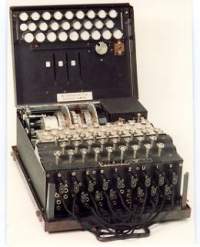
1939 Enigma: Poland gives Britain and France each an Enigma machine whose German codes they have broken. Thanks to this the Allies will be able to interpret secret Nazi messages during most of the war.
1940 World War II: Various:
Italy bombs the British naval base at Alexandria and the base at Haifa:
The Italian declaration of war in June 1940 challenged the British supremacy of the Mediterranean, a supremacy hinged on Gibraltar, Malta, and Alexandria. While Gibraltar was never under direct attack, Alexandria and Malta were hit repeatedly by Axis attacks.
USA: The export of oil and metal products in several categories is prohibited, except under license. This action is clearly anti-Japanese, because of Japan's need for foreign oil. From this time on, Japanese oil stocks begin to decline.
[See: Countdown to Infamy: Timeline to Pearl Harbor.]1941 World War II: Various:
Malta: Thirty-three Italian naval assault troops attempt to enter Valletta harbor, to attack British ships; but they are discovered. Fifteen men are killed and eighteen are taken prisoner.
In the first six months of 1942, there was only one 24-hour period without air raids. Luftwaffe records indicate that between 20 March and 28 April 1942, Malta was subjected to 11,819 sorties and subjected to 6,557 tonnes of bombs. During the greatest times of starvation it is said that foods were rationed to "three boiled sweets, half a sardine and a spoonful of jam a day.
USA: All Japanese and Chinese assets are frozen.
1942 Holocaust: Jewish police deliver 7,000 Jews for transport to Treblinka and from then on deliver a minimum daily rate of 10,000. The average Jewish policeman in the Warsaw Ghetto sends 2,000 Jews to their death. (THP)
Whilst the Jews in the ghetto were dying, they weren't dying quickly enough as far as Berlin was concerned. Hitler's original plans to ship all European Jews to Africa were proved impractical, and so it was that the chilling 'Final Solution' was decided upon, early in 1942. Between July and September of that year 300,000 ghetto Jews were transported to the Treblinka Extermination Camp, in the Nazis first mass deportation effort. At first few believed, including the Jews themselves, that the rumors of these death camps were real, preferring to believe that they being sent to hard labor camps. Eventually the evidence that was fed back (by escapees from the camps and by various secret agents and journalists) became irrefutable. The 60,000 remaining occupants of the ghetto had no choice but to confront the awful truth.
1943: Mussolini falls from power:
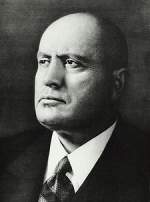
During the evening of July 24 and the early hours of the 25th, the Grand Council of the fascist government met to discuss the immediate future of Italy. While all in attendance were jittery about countermanding their leader, Mussolini was sick, tired, and overwhelmed by the military reverses suffered by the Italian military. He seemed to be looking for a way out of power. One of the more reasonable within the Council, Dino Grandi, argued that the dictatorship had brought Italy to the brink of military disaster, elevated incompetents to levels of power, and alienated large portions of the population. He proposed a vote to transfer some of the leader's power to the king. The motion was passed, with Mussolini barely reacting. While some extremists balked, and would later try to convince Mussolini to have those who voted with Grandi arrested, Il Duce was simply paralyzed, unable to choose any course of action.
Shortly after the Grand Council vote, Mussolini, groggy and unshaven, kept his routine 20-minute meeting with the king, during which he normally updated Victor Emanuel on the current state of affairs. This morning, the king informed Mussolini that General Pietro Badoglio would assume the powers of prime minister and that the war was all but lost for the Italians. Mussolini offered no objection. Upon leaving the meeting, he was arrested by the police, who had been secretly planning a pretext to remove the leader for quite some time. They now had the Council vote of "no confidence" as their formal rationale. Assured of his personal safety, Mussolini acquiesced to this too, as he had to everything else leading up to this pitiful denouement. When news of Mussolini's arrest was made public, relief seemed to be the prevailing mood. There was no attempt by fellow fascists to rescue him from the penal settlement on the island of Ponza to which he was committed. The only remaining question was whether Italy would continue to fight alongside its German allies or surrender to the Allies.
1944 World War II: Various:
Overlord: The US First Army breaks through the German lines between Caen and Saint Lo, and out of the Normandy beachhead. One of the bloodiest days for Canadians during the war: 18,444 casualties, including 5,021 killed.
The Germans had five armored divisions and various other infantry units in the area. Since these units had been available on the first day of the operation the chance of an Allied break through was small. After the air and artillery bombardment that had preceded the attack, the Canadians could have reached their goal on 25 July but, because of the strong German resistance, were forced to withdraw entirely or at least pull back to defensive positions.
[See: Why Was Churchill Against the D-Day Invasion?]
Eastern front: Narva and the Narva bend are evacuated and troops take up position along the Tannenberg Position. Soviet forces cut the road between Dvinsk and Riga in Latvia. Lvov is surrounded, and Soviet forces converge on Brest-Litovsk. "The Tannenberg Line anchored on three strategic hills. Running west to east, these were known as Hill 69.9, Grenadier Hill and Orphanage Hill. From Orphanage Hill, the rear side of the town of Narva could be protected . . . . "
Wunderwaffen: An experimental V-2 rocket which failed to explode is salvaged by the Polish underground and flown to England on a special plane. It reveals details of German rocket attacks.
The V-2 was the first ballistic missile used in warfare and a significant advancement in rocket technology. Also known as the A4, it was developed by Nazi Germany during World War II and used against the Allies, primarily as a terror weapon. Because it was so inaccurate (it could barely hit a city-size target), it could not be used against specific military targets and was instead used against civilians who had no defense against it as it came screaming down from the upper atmosphere. Adolf Hitler named it his "Vengeance Weapon 2"or "V-2" because it wreaked vengeance upon a helpless population. (The "Vengeance Weapon 1," or "V-1", was a cruise missile.) Despite its relative inaccuracy, the V-2 incorporated several major technological advances in rocketry.
1945 Truman drops hint to Stalin about a terrible new weapon:

On this day in 1945, President Harry S. Truman nonchalantly hints to Soviet Premier Joseph Stalin that the United States has successfully developed a new weapon. In his diary, Truman privately referred to the new weapon, the atomic bomb, as "the most terrible bomb in the history of the world."
The United States had successfully tested the world s first atomic weapon near Alamogordo, New Mexico, on July 16, 1945. Truman received the news while in Potsdam, Germany, conferring with British Prime Minister Winston Churchill and Soviet leader Joseph Stalin on post-World War II policy in Europe. On July 17, Truman told Churchill of the test s success and the two agreed to put off telling Stalin about what Truman called the "dynamite" news until later—Truman first wanted to get Stalin to agree to enter the Pacific war on the Allies side "with no strings on it."
On July 25, after receiving Stalin s pledge to join the U.S. in the war against Japan in the Pacific, Truman casually informed the Soviet leader that the United States "had a new weapon of unusual destructive force." Although Stalin did not appear to be impressed by the news, Truman hoped the information would increase the pressure on Stalin to concede to the Allies demands regarding the post-war division of Europe. [For further details, Click here.]

1945 International Conference on Military Trials: During this day's Four Power conference session, Justice Robert Jackson declares: "I think that every one of the top prisoners that we have is guilty. [For the full text of today's proceedings, Click here.]
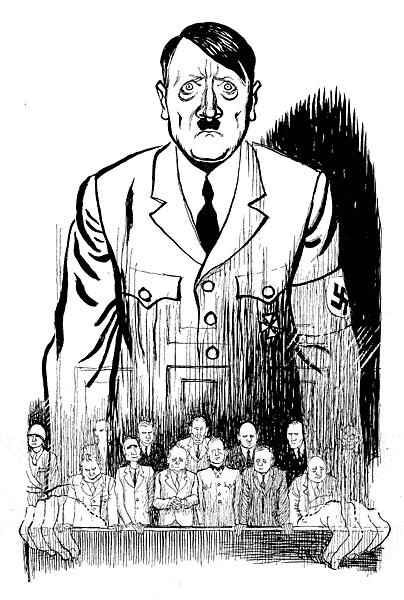
1946 Nuremberg Tribunal: Defense summations continue in the Major War Criminals Trial. One point in common with nearly all of the arguments of the various Defense Counsel is that there is a major absence among the Defendants; Adolf Hitler himself.
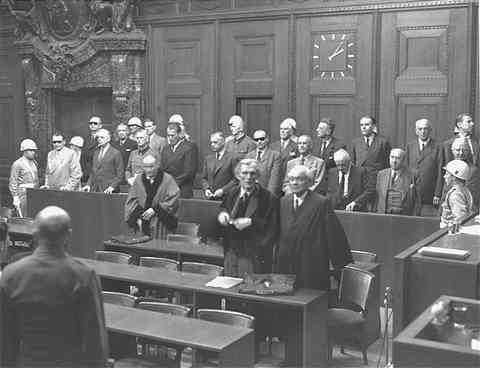
Before the war Fritzsche carried on no anti-Semitic propaganda of any kind. All utterances and statements of his submitted by the Prosecution originated during the war. They are, however, not directed against the Jews as a people or as a race, but are related only to the question of the origin of the war. They were merely casual, polemical remarks on the Jewish question in the propaganda battle which was fought in this war alongside the battle of arms. This explains the fact that the radio addresses submitted by the Prosecution never contain more than casual remarks, and never speak of the Jews alone. Every one of his radio speeches may be examined in this respect.
Nor does there exist a speech by him which dealt exclusively with the so-called Jewish problem. He never undertook to talk on such a subject. Fritzsche always spoke, at the same time, of "plutocrats," "bolshevists," "democrats," and used other such phrases by means of which the propaganda of the Third Reich felt obliged to conduct its fight. During his interrogation he dealt in detail with each of the radio addresses submitted in the Trial and discussed the reason he had each time for making his merely incidental remarks on this subject. An examination of all of his statements over the radio would show that of all the fundamental propaganda subjects of Nazi ideology, Fritzsche mentioned and advocated anti-Semitism least of all. This takes all foundation from the conclusion of the Prosecution. For there cannot be any connection between such occasional remarks on the part of Fritzsche and the murder order given by Hitler.

If the presentation of evidence in this Trial has revealed anything with certainty, then it is the proof of the position of enormous political power and unimaginable authority which Adolf Hitler held within the German governmental system. When Generaloberst Jodl testified on the witness stand that there was no one who could successfully contradict Hitler in the long run and that such a person could not exist, then one might say that he expressed the true state of affairs in a few words. That may perhaps be regrettable, but cannot in any way alter the facts as such. Now, if one also bears in mind that this dominant position of Hitler became constantly greater during the course of the years, then this alone should be sufficient to exclude the assumption of a common plan, such as is alleged in the Indictment.
In any case, the following must be said: The former Party leaders, generals and cabinet members indicted before this Tribunal receive an importance in this Trial because of Hitler's death which it is apparent they actually did not have in public life in the past. While the entire political life of Germany was overshadowed during the past 12 years by the overwhelming influence of Hitler's personality, the absence of this man from the defendants' bench affects this Trial in such a manner that it undoubtedly must result in an entirely distorted picture of the political reality of the past 12 years.
1969 The Nixon Doctrine is announced: President Richard Nixon announces that henceforth the United States will expect its Asian allies to tend to their own military defense. The Nixon Doctrine, as the president's statement came to be known, clearly indicated his determination to "Vietnamize" the Vietnam War. [For further information, click here.]
1973 From a letter to Albert Speer from his brother Hermann:
But all of you happily went along with that stupid hatred of the Jews. I remember you telling me in 1938 that you had suggested to Himmler to set up brickworks in Oranienburg [concentration camp] for the reconstruction of Berlin. And jokingly, you pointed out a precedent: "After all," you said with that total cynicism you habitually manifested toward moral problems, "the Jews already made bricks under the Pharaohs." (Sereny)
2003 Death: Ludwig Boelkow: one of the aeronautical pioneers of Germany. Born in Schwerin as the son of an employee of the Fokker company he studied airplane engineering in Berlin. During World War II he was the lead engineer at the Messerschmitt AG building the first jet plane, the Me 262. After the war he created the Boelkow GmbH in Ottobrunn, which with time grew to the biggest aeronautics and space-flight company, MBB (Messerschmitt-Boelkow-Blohm). In the early 1990's it was bought by DASA.
Edited by Levi Bookin (Copy editor) Click to join 3rdReichStudies Disclaimer: This site includes diverse and controversial materials—such as excerpts from the writings of racists and anti-Semites—so that its readers can learn the nature and extent of hate and anti-Semitic discourse. It is our sincere belief that only the informed citizen can prevail over the ignorance of Racialist "thought." Far from approving these writings, this site condemns racism in all of its forms and manifestations.
levi.bookin@gmail.com










Fair Use Notice: This site may contain copyrighted material the use of which has not always been specifically authorized by the copyright owner. We are making such material available in our efforts to advance understanding of historical, political, human rights, economic, democracy, scientific, environmental, and social justice issues, etc. We believe this constitutes a "fair use" of any such copyrighted material as provided for in section 107 of the US Copyright Law. In accordance with Title 17 U.S.C. Section 107, the material on this site is distributed without profit to those who have expressed a prior interest in receiving the included information for research and educational purposes. If you wish to use copyrighted material from this site for purposes of your own that go beyond 'fair use', you must obtain permission from the copyright owner.
Please Note: The list-owner and moderators of 3rdReichStudies are not responsible for, and do not necessarily approve of, the random ads placed on our pages by our web server. They are, unfortunately, the price one pays for a 'free' website.



